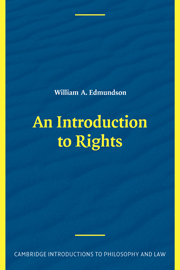Book contents
- Frontmatter
- Contents
- List of Tables
- Preface
- Part One The First Expansionary Era
- 1 The Prehistory of Rights
- 2 The Rights of Man: The Enlightenment
- 3 “Mischievous Nonsense”?
- 4 The Nineteenth Century: Consolidation and Retrenchment
- 5 The Conceptual Neighborhood of Rights: Wesley Newcomb Hohfeld
- Part Two The Second Expansionary Era
- Bibliographical Notes
- References
- Index
3 - “Mischievous Nonsense”?
Published online by Cambridge University Press: 08 January 2010
- Frontmatter
- Contents
- List of Tables
- Preface
- Part One The First Expansionary Era
- 1 The Prehistory of Rights
- 2 The Rights of Man: The Enlightenment
- 3 “Mischievous Nonsense”?
- 4 The Nineteenth Century: Consolidation and Retrenchment
- 5 The Conceptual Neighborhood of Rights: Wesley Newcomb Hohfeld
- Part Two The Second Expansionary Era
- Bibliographical Notes
- References
- Index
Summary
By the close of the eighteenth century, the rhetoric of rights had proven its capacity to inspire and to motivate individuals strongly enough to undermine the established political and moral order. But it had not succeeded in establishing itself as a coherent and well-founded mode of discourse. In Britain's former American colonies, the Bill of Rights completed a charter of government that, though experimental, ultimately proved to be one of the most successful in human history. But in France, the Declaration of the Rights of Man and the Citizen proved incapable of preventing the Revolution from degenerating into a Reign of Terror. If the American and the French Revolutions were to be considered as experiments in the practical value of making the concept of rights central to our understanding of our political arrangements, the results were decidedly mixed.
Even many of the British friends of the cause of the American colonists, such as Edmund Burke, Jeremy Bentham, and John Austin, deplored the rhetorical emphasis upon rights. As for wholesale political and moral reform in England, Burke was not in favor, and utilitarians such as Bentham and Austin looked not to the idea of rights but to that of utility as the conceptual key to remaking society.
Edmund Burke
From the standpoint of England, the events of 1789 in France were as alarming to some as they were inspiring to others.
- Type
- Chapter
- Information
- An Introduction to Rights , pp. 41 - 60Publisher: Cambridge University PressPrint publication year: 2004



